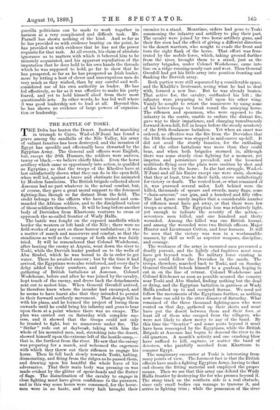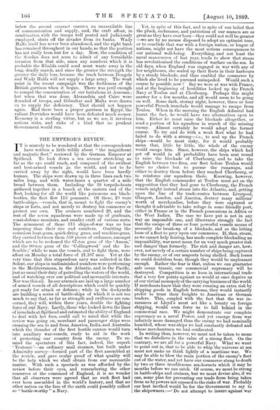THE BATTLE OF TOSKI. T HE Delta has beaten the Desert.
Instead. of marching in triumph to Cairo, Wad-el-N'Jumi has found a grave among the sandhills of the Nile Valley, his army of valiant fanatics has been destroyed, and the invasion of Egypt has speedily and. effectually been thwarted by the Egyptian Army. The General and. officers were English, but, except the 20th Hussars, the soldiers were natives, tawny or black,—we believe chiefly black. Even the horse artillery which came so opportunely into action, is qualified as Egyptian ; so that the troops of the Khedive have at last satisfactorily shown what they can do in the open field, when well led, against a brave and obstinate foe animated by Moslem fanaticism. The British brigade collected about Assouan had no part whatever in the actual combat, but, of course, they gave a great moral support to the foremost fighting-line, though so far distant from the field. The credit belongs to the officers who have trained. and. com- manded the African soldiers, and to the disciplined valour of those soldiers themselves. It will be long before another body of Dervishes from Khartoum ventures to cross or approach the so-called frontier of Wady Haifa. The battle was fought on the exposed sand.hills which border the western or left bank of the Nile ; there were no field-works of any sort on these barren' undulations ; it was a matter of march and manoeuvre and combat, so that the steadiness as well as the courage of both sides was fairly tried. It will be remembered. that Colonel Wodehouse, after beating the enemy at Arguin, went down the river to Toski, while the Dervish leader pushed on to the wells of Abu Simbel, which he was bound to do in order to get water. There he awaited succour ; but by the time it had arrived, the Egyptians were also reinforced, and every day's delay added to their numbers, and. gave time for the gathering of British battalions at Assouan. Colonel Wodehouse, before and. after he was joined by the cavalry, kept touch of the enemy, and. drove back the detachments sent out to molest him. When General Grenfell arrived, he therefore knew where the invader had encamped, and he seems to have learnt also that they intended to persist in their forward northerly movement. That design fell in with his plans, and he formed the project of luring them onwards until he could bring his infantry and. guns to bear upon them at a point whence there was no escape. The plan was carried out on Saturday with complete suc- cess, and it showed that the troops could not only be trusted. to fight, but to manoeuvre under fire. The " Sirdar " rode out at daybreak, taking with him the whole of his mounted men, and, stretching into the desert, showed himself upon the extreme left of the hostile camp,— that is, the furthest from the river. He saw that the enemy was preparing for a march, and welcomed the eagerness with which they threw out their riflemen to engage his horse. Then he fell back slowly towards Toski, halting, dismounting, and firing from the ridges as he passed them, and drawing upon his handful the whole force of his adversaries. That their main body was pressing on was made evident by the glitter of spear-heads and the flutter of flags. The disinclination of the cavalry to engage in close fighting must have given confidence to the pursuers, and in this way some hours were consumed, for the horse- men were in no haste, and every halt brought their enemies to a stand. Meantime, orders had gone to Toski summoning the infantry and artillery to play their part. The cavalry were joined by two horse artillery guns, and their fire soon had the effect of giving a different direction to the desert warriors, who sought to evade the front and turn the right flank of the horse. That effort was frus- trated by the mobile force, which, taking ground further from the river, brought them to a stand, just as the infantry brigades, under Colonel Wodehouse, came into line on a ridge running nearly east and. west. Thus General Grenfell had got his little army into position fronting and flanking the Dervish array.
Both parties were still separated. by a considerable space, and the Khalifa's lieutenant, seeing what he had to deal with, formed a new line. But he was already beaten.. That active foe, the cavalry, outflanked his left ; the infantry were preparing to fall upon his other wing. Vainly he sought to retort the manoeuvre by using some of his better troops to break round. the annoying horse. The riflemen and spearmen, who were opposed. to the infantry in the centre, unable to endure the distant fire, gave way to their impatience, and charging tumultuously forward down-hill, fell in heaps before the steady musketry of the 10th Sondanese battalion. Yet when an onset was ordered, so effective was the fire from the Dervishes that the 13th Soudanese was stopped. in mid-career up-hill. It did. not avail the sturdy fanatics, for the enfilading fire of the other battalions was more than they could bear, and when both brigades stormed in, although there was some sturdy close fightinc, for a moment, yet impetus and persistence prevailed, and the loosened multitude flying over the plain were smitten by shot and ridden down by the horse. In the last struggle, Wad-el- N'Jumi and. all his Emirs except one were slain, showing that they at least, true to their faith, strove unfalteringly for victory or death. The routed host, or what remained of it, was pursued several miles. Left behind. were the killed, thousands of spears and swords, many flags, some "chain-armour," one gun, and a, hundred and fifty rifles. The last figure surely implies that a considerable number of riflemen must have got away, or that there were few troops so armed. The Egyptian loss was relatively light, yet enough to indicate the severity of the action,— seventeen men killed, and one hundred and thirty wounded. Among the killed. was one British hussar, and among the wounded were two British officers, Major Hunter and Lieutenant Cotton, and four hussars. It will be seen that the victory was won in a workmanlike manner, by skill as well as superior weapons, discipline, and courage.
The weakness of the army in mounted men prevented a deadly pursuit, and the lightly clad fugitives must soon have got beyond reach. No military force existing in Egypt could follow the Dervishes in the sands. The troops, therefore, marched back to Toski, and on Sunday General Grenfell betook himself to a gunboat, hoping to cut in on the line of retreat. Colonel Wodehouse and Colonel Kitchener as soon as possible scoured the country near Toski and Abu Simbel, finding nothing but the dead or dying, and the Egyptian battalion in garrison at Wady Haifa pushed up to and occupied. Sarnia. We need not follow the movements of the Egyptians further, as nothing now done can add. to the utter disaster of Saturday. What remained of the three thousand fighting-men who were routed on that day, gathered up their skirts and must have put the desert between them and their foes, at least all of them who escaped from the villagers, who were not likely to show mercy to any of the band. By this time the "frontier" and some posts beyond it must have been reoccupied by the Egyptians, while the British Brigade at Assouan has begun to descend the river to its old quarters. A month's activity and one crushing blow have sufficed to kill, capture, or scatter the band of devotees, who painfully marched from Khartoum to conquer Egypt. The sanguinary encounter at Toski is interesting from many points of view. The foremost fact is that the British officers have made a fighting Egyptian Army, having to that end chosen the fitting material and employed the proper means. Then we see that this army can defend the Wady Haifa frontier by destroying the foe who presses beyond it. The stony track on the southern side is a real obstacle, since only small bodies can manage to traverse it, and arrive in fighting trim ; while the possession of the river below the second cataract ensures an unassailable line of communication and supply, and, the craft afloat, in combination with the troops well posted and judiciously employed, shuts off the invader from its banks. Wady Haifa itself has never been abandoned, and the right bank has remained throughout in our hands, so that the position has not really been lost for a day. Now, the condition of the Soudan does not seem to admit of any formidable invasion from that side, since any numbers which it is probable the Khalifa could send must waste away in the long, deadly march, and since the greater the strength the greater the daily loss, because the track between Dongola and Wady Haifa will not supply a large army. The weak point in the recent campaign was the feebleness of the British garrison when it began. There was peril enough to compel the concentration of our battalions at Assouan ; but when that was done, Alexandria and Cairo were denuded of troops, and. Gibraltar and Malta were drawn on to supply the deficiency. That should not happen again. Had there been a proper garrison in Egypt, the valiant Dervishes would have been defeated much sooner. Economy is a sterling virtue, but as we see, it involves serious risks, and risks of a kind that no prudent Government would run.



































 Previous page
Previous page